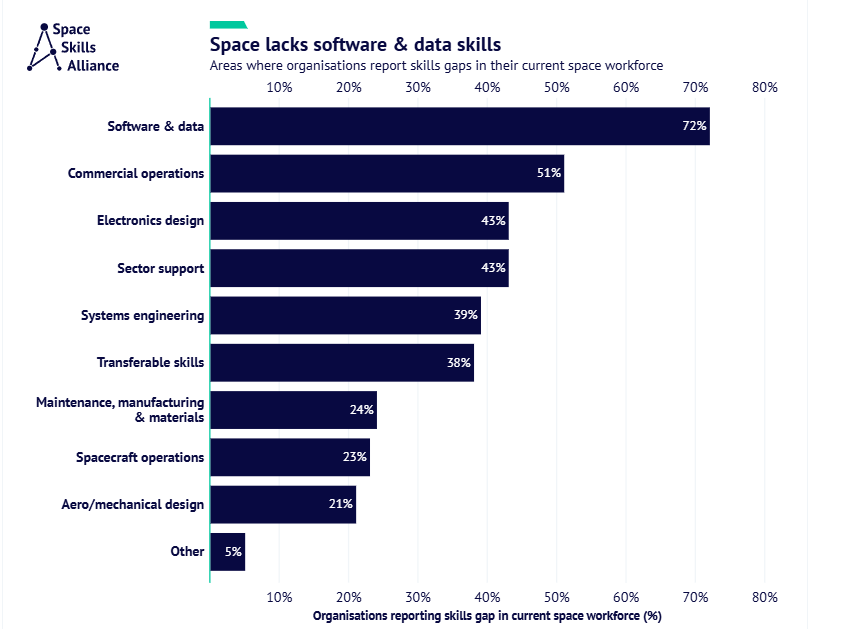OBSERVER: How the Space Career Launchpad helps narrow the skills gap in Europe’s space industry

OBSERVER: How the Space Career Launchpad helps narrow the skills gap in Europe’s space industry
sonia
Wed, 05/11/2025 – 11:52
Across Europe, the demand for space skills is rising quickly, with new projects creating opportunities which extend well beyond engineering. From climate monitoring to digital services enabled by space-based assets, space is more than ever part of our everyday lives. This growth is also opening the door to new career opportunities for young people across the continent. To help bridge this gap and facilitate this pathway, the European Commission has launched the Space Career Launchpad: an initiative which connects students and graduates with employers, helps build the skills which industry needs, and creates pathways to meaningful careers in space. In this Observer, we explore how the initiative bridges study and work, promotes inclusion, and helps Europe’s space sector remain competitive on the global stage.
Europe’s space industry is expanding rapidly. From Earth Observation satellites which support agriculture and protect coastlines or support emergency management, to navigation services which keep planes flying safely, demand for talent has never been higher. Yet the pipeline of people ready to step into roles in the space industry is not keeping pace.
The European Commission has identified a critical gap between the skills provided by current educational curricula and the needs of the European space industry. Across Europe, universities are producing highly skilled graduates in STEM disciplines and policy, providing a strong foundation for the European space ambitions. The next step lies in translating this academic excellence into practical experience and ensuring that opportunities are accessible to all. Through the expansion of early career pathways and the promotion of greater inclusion, particularly for women, the space sector can unlock a broader, more dynamic pool of talent to drive Europe’s growth in space.
Recent research by the European Space Policy Institute (ESPI) across a sample of around 3,000 vacancies in Europe over six months, showed that young professionals are struggling across all stages of their transition into the workforce, with most of the demand being for mid-level staff. Similar findings were made in the Space Sector Skills Survey (S4) (2023), in which 61% of organisations surveyed reported skills gaps among job applicants, with software and data skills flagged by 72% of those reporting gaps. Additionally, competition from other high-technology sectors continues to draw talent away from space.
What is clear is that when it comes to the skills market in the European space industry, demand is rising, supply is constrained, and mismatches are adding risk. The availability of skilled talent therefore remains a key enabler for Europe’s strategic aim of space sovereignty and competitiveness.

The Space Career Launchpad
Acknowledging these challenges, the European Commission announced in 2024 initiatives aiming to improve the skills situation in the space sector. One of these is the Space Career Launchpad, officially presented in October 2024 as the European Commission’s commitment to building a “skilled, inclusive and diverse workforce” for the EU space sector.
The Space Career Launchpad is a digital platform which connects students, graduates, employers, and educators across Europe’s growing space sector. It serves both as an educational bridge and as a labour-market connector, helping young people gain experience while supporting employers in finding skilled talent. It also seeks to inspire a new generation to pursue space careers through awareness raising campaigns which highlight the wide range of opportunities available in the space industry.
For students and recent graduates, the Launchpad provides a dedicated job portal listing internships and early-career positions across Europe. Managed by the STARS*EU consortium on behalf of the European Commission, it also organises events, and provides mentoring and guidance to help newcomers navigate the industry. Employers, from small start-ups to major aerospace firms, can advertise vacancies, search candidate profiles, and use the media toolkits provided to reach a wider talent pool and audience.
Education and training providers are equally central to the ecosystem. The Launchpad also features educational resources to guide students through space-related career paths and links to an education directory covering all space-related curricula in the EU, guiding site visitors toward relevant training and upskilling opportunities.

Building an inclusive and diverse workforce
The Space Career Launchpad is contributing to shaping a skilled, inclusive, and diverse workforce for Europe’s space sector. Increased visibility of the wide range of opportunities available encourages students and early-career professionals from all backgrounds to see space as an accessible and exciting career path.
The Launchpad helps translate that awareness into tangible action by supporting inclusive recruitment and providing accessible early-career routes. Its broader focus on inclusion also ensures that Europe’s space workforce reflects the diversity of skills and perspectives needed to tackle complex global challenges. In supporting diverse educational and professional backgrounds, the Launchpad strengthens the adaptability and resilience of Europe’s space ecosystem. By fostering inclusion, it encourages the development of new ideas and perspectives which fuel innovation, creativity, and long-term competitiveness across the sector.

A foundation for Europe’s space ambitions
The Space Career Launchpad directly supports Europe’s wider ambitions for strategic autonomy, competitiveness, and industrial resilience. Flagship initiatives such as Copernicus for Earth Observation and Galileo for navigation rely on a steady inflow of skilled professionals. Human capital will therefore play a central role in turning Europe’s space investments into real operational success. By focusing on early-career experience, curriculum alignment, cross-industry mobility, and inclusive pathways, the Launchpad addresses multiple dimensions of the skills challenge and lays the groundwork for a steady flow of new talent, helping Europe’s space sector remain competitive and fit for purpose in the years ahead.

Thu, 06/11/2025 – 12:00


